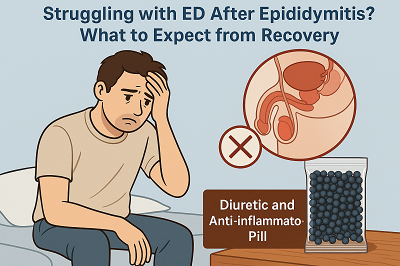Struggling with ED After Epididymitis? What to Expect from Recovery
In the field of male health, epididymitis and erectile dysfunction are two conditions that often cause great concern for patients. Especially when the former leads to the latter, the duration of recovery becomes a major concern that lingers in their minds. To figure out how long it takes for impotence caused by epididymitis to be cured, we must first deeply understand the intricate connections between epididymitis and impotence.

Epididymitis, in simple terms, refers to inflammation of the epididymis. The epididymis is an important site in the male reproductive system where sperm are stored and transported. Once it becomes inflamed, it not only affects the quality and vitality of sperm, but may also influence male sexual function through complex physiological mechanisms. The stimulation of inflammation will cause local pain, distension and other discomfort symptoms.
This long-term physical discomfort can have a negative impact on a man's psychology, leading to anxiety, tension and other negative emotions, which are common psychological factors that trigger impotence. Moreover, if epididymitis is not treated promptly and effectively, the spread of inflammation may affect surrounding reproductive organs and influence the secretion of male hormones, thereby causing erectile dysfunction, which is what we call impotence.
So, how long does it take to cure impotence caused by epididymitis?
There is no definitive and uniform answer to this question, as numerous factors influence recovery time.
Firstly, the severity of the condition is crucial. If the epididymitis is in the early stage, with a smaller range of inflammation and less impact on the reproductive system and sexual function, then with active treatment, the recovery time may be relatively shorter.
On the contrary, if the epididymitis has persisted for a long time, with extensive inflammation and severe damage to the epididymis and surrounding tissues, along with more obvious symptoms of impotence, the treatment period will be longer and the recovery time will be more prolonged.
Secondly, the choice of treatment method plays a decisive role in the recovery time. Currently, there are various treatment options for epididymitis combined with impotence, including antibiotic treatment, physical therapy, psychological therapy, and traditional Chinese medicine treatment etc. Among these treatment methods, the traditional Chinese medicine product "Diuretic and Anti-inflammatory Pill" has gradually gained attention from both patients and doctors due to its unique advantages.
The traditional Chinese medicine "Diuretic and Anti-inflammatory Pill" is a pure herbal preparation. It follows the principles of traditional Chinese medicine and is composed of various natural Chinese medicinal herbs in a rational combination. Its formula contains heat-clearing and toxin-resolving herbs, which can effectively inhibit and eliminate inflammation in the epididymis, addressing the root cause of epididymitis.
At the same time, the blood-activating and stasis-resolving medicinals in the formula can improve blood circulation in the epididymis, promote the absorption and dissipation of inflammation, and alleviate local pain, distension, and other uncomfortable symptoms. Moreover, the diuretic and drenetic medicinal components help improve the function of the urinary system, accelerate the excretion of inflammatory substances, and further promote the recovery of epididymitis.
In the treatment of impotence caused by epididymitis, the traditional Chinese medicine "Diuretic and Anti-inflammatory Pill" also plays an important role. According to traditional Chinese medicine, the occurrence of impotence is closely related to factors such as deficiency of liver and kidney, and insufficiency of qi and blood.
The herbs in Diuretic and Anti-inflammatory Pill not only alleviate inflammation but also regulate the balance of qi, blood, and yin-yang in the human body, nourish the liver and kidneys, and enhance the overall body function. When epididymitis is effectively controlled, the normal operation of qi and blood in the body is restored, kidney function improves, and the symptoms of impotence gradually ease.
Apart from the illness and treatment methods, individual patient differences also affect the recovery time. Different patients have varying physical conditions, living habits, and psychological states. Patients with better physical conditions and healthier living habits tend to have stronger recovery abilities during the treatment process, allowing them to cooperate more effectively with the treatment, which in turn results in a relatively faster recovery speed.
On the contrary, if patients have long-term bad living habits, such as staying up late, smoking, and excessive drinking, it not only affects the treatment outcome but also delays the recovery process.
At the same time, the psychological state of patients is also crucial. Maintaining an optimistic attitude can better cope with the disease and promote the recovery of the body. At the same time, excessive anxiety, depression, and other negative emotions may aggravate the condition and prolong the recovery time.
Generally speaking, for patients with mild conditions who receive standardized treatment with the traditional Chinese medicine "Diuretic and Anti-inflammatory Pill" promptly, the symptoms of epididymitis may significantly improve after continuous medication for about 1 to 3 months. The condition of impotence may also be alleviated. However, patients with more severe conditions may need to continue taking the medicine for 3 to 6 months or even longer to achieve the desired therapeutic effect and fully recover from epididymitis and impotence.
It is essential to emphasize that during the treatment of epididymitis and impotence, patients must strictly follow their doctor's instructions, take the prescribed medication on time and in the correct dosage, and refrain from increasing or decreasing the dosage on their own or stopping the medication.
At the same time, they should develop good living habits, maintain a regular schedule, avoid excessive fatigue, have a balanced diet, consume more nutritious foods to enhance their immunity and engage in moderate physical exercise to promote blood circulation and improve their physical functions.
Moreover, patients should also pay attention to psychological adjustment, avoid excessive psychological pressure caused by the disease, and can relieve anxiety through communication with family and friends, participating in social activities, etc., to maintain a good state of mind.



